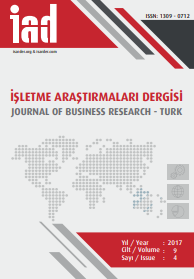Does The E-Loyalty Increase As The Consumer's Access To The Internet Increases? An Empirical Study In Turkey
Does The E-Loyalty Increase As The Consumer's Access To The Internet Increases? An Empirical Study In Turkey
Author(s): Naci Büyükdağ, Olgun KitapciSubject(s): Economy, Psychology, Business Economy / Management, Evaluation research, ICT Information and Communications Technologies
Published by: Orhan Sağçolak
Keywords: E-satisfaction; E-loyalty; Moderation; The Internet Experience; Statistical Power Analysis;
Summary/Abstract: The purpose of the study is to investigate whether the level of the Internet experience has a moderating effect on the relationship between e-satisfaction and eloyalty. Because according to the literature, the moderator effect of internet usage level has not been investigated in terms of the relationship between e-satisfaction and eloyalty. Therefore, there is a gap in the literature and this study aims to fill it. Multivariate methods were applied in this study. The level of the Internet experience has been the moderator effect on the relationship between e-satisfaction and e-loyalty. Consumers with low the Internet experience were found to show more e-loyalty than those who had high the Internet experience. As the internet usage increases competition, it is suggested that e-commerce companies should be differentiated from other competitors through e-trust, branding of the web site, use of social media communication channels and participation in social responsibility projects.
Journal: İşletme Araştırmaları Dergisi
- Issue Year: 9/2017
- Issue No: 4
- Page Range: 139-154
- Page Count: 16
- Language: English

